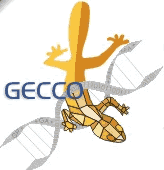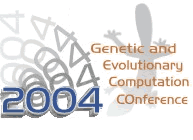

June 26 - 30, 2004
Saturday to Wednesday
Seattle, Washington, USA
Session: |
LBP - Late Breaking Papers |
Title: |
An Agent Too Far: The Genetic Distance Evaluation of a Simulated World |
Authors: |
E. J. P. Earon |
Abstract: |
One of the fundamental features, and one of the lesser understood phenomena, in biology is that of speciation. In order to better understand the development and creation of species, and their role in evolution, a method for tracking speciation in simulation is presented. While there is much dispute in the field of biology as to the precise definition of the term species, there is little debate that the natural world is full of distinct subpopulations. A genetic framework which permits a precise definition of a species is presented as it is implemented in the Cyberis simulator. The framework uses the notion of the Levenshtein distance as applied to the genomes of the agents to dynamically specify speciation during simulation. This allows for the study of artificial evolution on a more accurate scale by investigating the performance and longevity of the species, a more robust indicator of the genetics than a single agent. The genetics also allow much freedom in the specification of the agent and allows similar flexibility in experiments in neutrality and genetic difference calculations. |
HomeProgramSearchAuthor Index
SponsorsCommitteeContact Us
